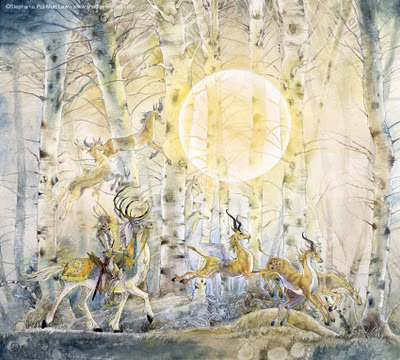Are You A Teacher In Israel, and Do Not Know These Things?
 ...the greatest part
...the greatest partOf mankind they corrupted to forsake
God their Creator, and the invisible
Glory of Him that made them to transform
Oft to the image of a brute, adorned
With gay religions full of pomp and gold,
And devils to adore for deities.
Paradise Lost, John Milton
This is a subject I have thought about nonchalantly for some time, taking it almost for granted with my own writing, until I was jostled by a little lack of information into considering it more seriously in general. Can I get any more vague than that...? The subject is that of religion in literature. I don't mean strictly fantasy, I mean historical fiction too (I consider science fiction to be a fantasy of a sort). The problem, I realized some time ago, is that you very rarely come across any signs, any gestures, any notion of religion in the pages of a book.
You might argue at first that this is because religion as a whole isn't usually the point of a story, and you don't want to muddy the waters, and you don't want to offend people, etc. I would like to respectfully blow both of those notions back where they came from. If you take a good look at human history in an over-arching sense, the way an eagle might look at a landscape, you will discover a wildly colourful but always persistent drive toward worship. Mankind has an inherent need to worship, and almost frantic need to worship. You will find that in every society you study, in every age you choose. Man will build a pantheon before he builds a code of law. It is so basic to his nature, so deeply woven into his psyche, so human that I find the lack of it in literature to be startlingly unrealistic.
So does every story have to be about gods and men, appeasement and atonement? Not always directly, of course not. But when you have a driving way of life, a paradigm that lies closer about a man than his own clothing, don't you think it a bit odd that it so rarely surfaces in stories about mankind? When I read I find two common default religions in stories: in the fantasy the religion of the character is his quest and his devotion to accomplishing it; in historical fiction (rather more accurately) the religion is that of self. But I have to read that back into the text because I'm looking for it. The author probably doesn't realize it at all. So acknowledge it! In The Eagle of the Ninth, which is one of my favourite novels, there is a scene in which Marcus desperately, ardently beseeches his god Mithras to clear the skies so that the smoke-signal can get through. It is pure paganism, and of course I don't agree a whit with the man, but I agree with the author for putting it in there. It would have been ludicrous for Sutcliff to have portrayed her soldier any differently. He was a centurion of the Roman army, a follower of the Persian god Mithras (who had become a favourite among Roman soldiers). It was not only accurate to history, it was accurate to man.
How do you show religion? There was a time not very long ago when religion was the cadence of life. You could not go a week without the community partaking in the heartbeat of it. Longer ago than that, before truth sorted out the muddle of religion, you had sacrifices and feast-days, a regularity and an importance of regularity that bound not only the people to their gods but the people to each other. That is a hard thing to miss and it is not hard to show. In historical fiction it might be as simple as noting the Sabbath hush that falls over a village, in fantasy it can be as subtle as a charm over a door to ward off evil. It need not be right (though I hope you know what right is) but it ought to be accurate, which a truth itself; and it ought to be there, if only to add another dimension to the story.
My novel The Shadow Things, rather less than subtle, took this bull by the horns. It takes place in a time when religion oppressed, when gods were to be appeased, not loved, and atonement was a word whose definition was not understood; it's grim, it's dark, but it's true. And in retrospect, looking back from the high vantage point of years in a culture levened by Christianity, I as the author and hopefully you as the reader can appreciate what kind of "religious" world the truth was going out into, and working against, and transforming. I might have made the gates of hell a little less grim, a little less resisting, but that would have been untrue. Yes, they gave way in The Shadow Things, but it was a hard and gruesome fight all the same.
However you do it, whether blatantly or subtly, don't forget this important aspect of humanity: he must worship something, and that need is too obvious to ignore even in literature.
"Oh—something!" he ejaculated, too flustered to know exactly what to swear by.
Published on December 14, 2011 06:08
No comments have been added yet.



